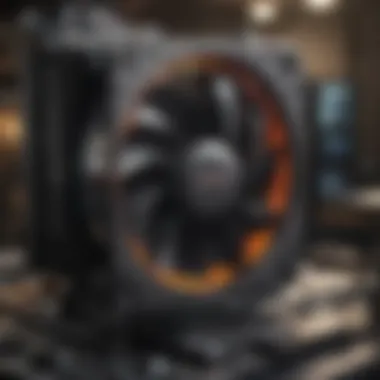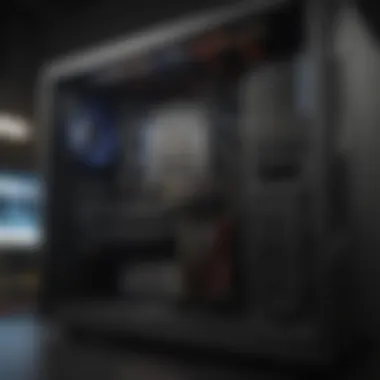Unveiling the True Costs of Crafting a Premium Gaming PC


This guide delves deep into the intricacies of assembling a high-performance gaming PC, focusing meticulously on the costs involved in creating a top-tier rig. For individuals passionate about technology and gaming, understanding the expenses of each component and effective budgeting is key to crafting a personalized gaming setup that aligns with one's preferences and needs.
News Updates
In the realm of gaming, entertainment, TV & Movies, esports, and technology, staying abreast of the latest developments is crucial. From noteworthy announcements and updates to upcoming release dates of games, movies, TV shows, and tech products, being informed about industry events and conventions highlights provides valuable insights for tech-savvy individuals and gaming enthusiasts seeking to optimize their gaming experience.
Reviews and Recommendations
Detailed reviews of popular games, movies, TV shows, esports events, and tech gadgets offer valuable perspectives for readers looking to invest in quality entertainment experiences. By exploring top picks, recommendations, and assessments of product features coupled with their pros and cons, consumers can make informed decisions on their entertainment and tech investments.
Tips and Tricks
Enhancing one's gaming skills and optimizing devices require beneficial strategies and hacks. From expert-level gaming techniques to valuable tech tips to improve device performance and efficiency, readers can access a wealth of information to enhance their gaming experiences and elevate their tech-savviness in a dynamic digital landscape.
Trending Topics
The technology, gaming, entertainment, TV & Movies, and esports spheres are constantly evolving with trending topics dictating conversations. Analyzing current trends, social media buzz, viral content, memes, and internet phenomena enables readers to delve into the pulse of the industry while leveraging insights on controversial issues, debates, and fandoms that shape the digital ecosystem.
Introduction
In the realm of PC gaming, the process of constructing a high-performance gaming rig serves as a crucible that amalgamates technical prowess, financial acumen, and unbridled passion for immersive gameplay experiences. This guide on the cost of building a quality gaming PC embarks on a journey to unravel the intricate tapestry that binds cutting-edge technology with individualized preferences in the realms of digital entertainment. For tech-savvy individuals and avid gamers alike, comprehending the nuances of assembling a bespoke gaming setup not only empowers them with tailor-made solutions but also fosters a deep-seated connection to the digital landscapes they traverse.
Eschewing prefabricated solutions in favor of hand-picking each component heralds a profound commitment to personalization and performance optimization tantamount to forging a digital masterpiece. Delving into the financial ramifications of each choice encompasses not only prudent budget allocation but also a strategic investment in future-proofing one's gaming arsenal. The Introduction section, as the vanguard of this comprehensive guide, sets the stage for an odyssey through components, costs, and considerations that culminate in the crafting of a gaming sanctuary where speed, visual fidelity, and reliability converge.
Understanding the Basics of Building a Gaming PC
In the realm of high-performance gaming PCs, understanding the fundamental aspects of building one is paramount. For tech enthusiasts and gaming aficionados embarking on the journey of crafting a personalized gaming setup, grasping the basics sets the foundation for a robust and efficient system. From selecting components that complement each other to optimizing performance and ensuring compatibility, having a solid comprehension of the building process is key to achieving the desired gaming experience.
Choosing the Right Components
Determining the CPU
When it comes to determining the central processing unit (CPU) for your gaming PC, the choice significantly impacts the overall performance and capabilities of your system. The CPU serves as the brain of the computer, executing instructions and processes that drive gaming performance. Opting for a CPU with high clock speeds, multiple cores, and advanced cache configurations is crucial for seamless gameplay and multitasking capabilities. However, balancing performance with cost-effectiveness is essential to strike the right equilibrium for your gaming needs.
Selecting the GPU
Selecting the graphics processing unit (GPU) plays a pivotal role in rendering visually stunning graphics and ensuring smooth gameplay. The GPU's architecture, memory capacity, and core clock speed all contribute to its performance in handling graphics-intensive tasks. By choosing a GPU tailored to your gaming preferences and resolution requirements, you can enhance the visual fidelity of games while maintaining a high frame rate for a fluid gaming experience.
Opting for Sufficient RAM
When opting for Random Access Memory (RAM) for your gaming PC, ensuring sufficient memory capacity is imperative for seamless multitasking and efficient data access. Adequate RAM allows for swift loading times, smooth gameplay, and optimal system performance. Balancing RAM capacity with memory speed and latency timings is essential to maximize gaming performance without overspending on excessive memory capacity.


Deciding on Storage Options
Deciding on the storage options for your gaming PC involves selecting between Solid State Drives (SSDs) and Hard Disk Drives (HDDs) based on performance, capacity, and cost considerations. SSDs offer faster data transfer speeds and quicker load times, ideal for storing the operating system and frequently played games. In contrast, HDDs provide higher storage capacities at a lower cost-per-terabyte, suitable for storing large game libraries and media files. Combining both storage types for a balanced approach can optimize system performance and storage efficiency.
Considering the Power Supply
Considering the power supply unit (PSU) when building a gaming PC is crucial for providing stable and sufficient power to all components. A high-quality PSU ensures reliable operation, efficient power delivery, and protection against power fluctuations or surges. Selecting a PSU with adequate wattage, efficiency ratings, and modular cables allows for future upgrades and system expansions while maintaining optimal power efficiency.
Selecting a Suitable Case
Selecting a suitable case for your gaming PC involves considering aspects such as form factor compatibility, cooling capabilities, cable management options, and aesthetic preferences. A well-designed case with ample airflow, fan mounts, and cable routing features contributes to optimal system cooling and component longevity. Additionally, choosing a case with customizable RGB lighting, tempered glass panels, and tool-less installation facilitates a visually appealing and user-friendly gaming rig.
Factors Influencing PC Build Costs
In the realm of building a gaming PC, various factors significantly influence the overall costs involved in assembling a high-performance system. From component quality and performance to brand preferences, current market trends, and considerations for upgradability and future-proofing, understanding these factors is essential for budgeting and optimizing the value of your gaming PC investment.
Component Quality and Performance
The quality and performance of components like the CPU, GPU, RAM, and motherboard directly impact the overall functionality and longevity of your gaming PC. Opting for components from reputable brands known for reliability, performance benchmarks, and advanced technologies ensures a stable and high-performing system. Investing in premium components with enhanced features such as overclocking support, advanced cooling solutions, and extended warranties can elevate your gaming experience but comes at a higher cost.
Brand Preferences
Brand preferences play a significant role in the costs associated with building a gaming PC, as brands often differentiate themselves based on build quality, performance optimizations, and customer support services. Choosing brands with a track record of delivering high-quality products, responsive customer service, and a strong community presence can offer peace of mind and reliability in your PC components. However, premium brands may come with a higher price tag, necessitating a balance between brand reputation and budget constraints.
Current Market Trends
Keeping abreast of current market trends in the PC hardware industry is crucial for making informed decisions on component purchases and system configurations. Trends such as the release of new product lines, advancements in technology, changes in pricing due to supply and demand dynamics, and emerging feature innovations influence the overall costs and performance capabilities of your gaming PC. Monitoring market trends allows you to capitalize on price fluctuations, promotional offers, and new product releases to optimize your PC build for performance and cost-effectiveness.
Upgradability and Future-Proofing
Considerations for upgradability and future-proofing are essential when building a gaming PC to ensure flexibility and longevity in your system. Opting for components that support future upgrades, such as CPU socket compatibility, GPU expansion slots, RAM expandability, and storage scalability, allows for seamless upgrades over time without requiring a complete system overhaul. Future-proofing your gaming PC by investing in high-quality, adaptable components ensures that your system remains relevant and capable of handling upcoming gaming technologies and software advancements.
Budgeting for Your Gaming PC
In the realm of budgeting for a gaming PC, establishing a realistic financial plan is crucial to balancing performance requirements with cost considerations. From setting a budget that aligns with your gaming needs to allocating funds for different components and exploring cost-saving strategies, effective budgeting ensures that you maximize the value of your PC build while staying within your financial constraints.
Setting a Realistic Budget
Setting a realistic budget for your gaming PC involves assessing your gaming requirements, performance expectations, and financial constraints to determine the optimal spending range. Factors such as the desired gaming resolution, frame rate targets, and anticipated gaming titles influences the budget allocation for components like the CPU, GPU, RAM, and storage. By setting a budget that accounts for both performance and cost considerations, you can prioritize essential components and features that enhance your gaming experience without exceeding your financial limits.
Allocating Funds for Different Components
Effective allocation of funds for different components in your gaming PC involves weighing the performance benefits and cost considerations of each part. Prioritizing key components like the CPU and GPU that have the most significant impact on gaming performance while allocating a proportionate budget for supporting components like RAM, storage, and the power supply ensures a balanced system configuration. By distributing your budget across components based on their importance to gaming performance and your overall budget constraints, you can create a well-rounded gaming PC that delivers optimal performance without overspending on excessive components.


Exploring Cost-Saving Strategies
Exploring cost-saving strategies when building a gaming PC allows you to optimize your budget and maximize the value of your components. Strategies such as timing your purchases during sales events, monitoring price trends for discounts, rebates, and bundle deals, and considering refurbished or secondhand components can help reduce overall costs without compromising performance. Additionally, comparing prices from different retailers, leveraging cashback offers, and considering alternative brands or models can provide cost-effective alternatives for budget-conscious builders. By strategically navigating cost-saving opportunities and prioritizing value over brand prestige, you can create a high-performance gaming PC that meets your gaming needs while staying within your intended budget.
Evaluating the Costs of Building a Gaming PC
Building a gaming PC demands meticulous consideration of costs to orchestrate a seamless assembly of high-quality components. By evaluating the costs comprehensively, one can ascertain the financial investment necessary for a top-tier gaming rig, optimizing performance and value. This section dissects the monetary aspects with precision, shedding light on the budget distribution across essential components.
Cost Breakdown of Essential Components
CPU and Motherboard
The CPU and motherboard serve as the fundamental pillars of a gaming PC, dictating its processing power and compatibility. Opting for a reliable CPU-Motherboard duo is crucial for system stability and performance. The synergy between the CPU's processing capabilities and the motherboard's connectivity features is imperative for seamless functionality. The selection of these components hinges on the user's specific requirements, be it gaming, content creation, or multitasking. Assessing the CPU and motherboard compatibility ensures optimal utilization of each component's potential, culminating in a coherent and potent gaming setup.
GPU (Graphics Card)
The GPU, or graphics card, plays an indispensable role in rendering lifelike visuals and enabling smooth gameplay. Its prowess in handling complex graphical computations determines the gaming PC's visual fidelity and performance. Selecting a GPU tailored to one's gaming needs is pivotal for immersive gaming experiences. The card's VRAM capacity, core clock speed, and architecture influence its performance, shaping the gaming experience. Balancing budget constraints with GPU capabilities guarantees a satisfying visual and gaming performance equilibrium.
RAM (Memory)
RAM, or system memory, acts as the temporary storage for data accessed by the CPU in real-time. Adequate RAM capacity ensures seamless multitasking, swift data processing, and smooth gameplay. The RAM's speed, capacity, and latency directly impact the gaming PC's performance, making it an essential component. Choosing the right RAM modules tailored to the system's requirements enhances overall performance, enabling efficient data access for heightened gaming experiences.
Storage (SSDHDD)
The storage solution, comprising SSDs and HDDs, determines data retrieval speeds, system boot times, and storage capacity within the gaming PC. SSDs offer rapid data access and quicker system responsiveness, ideal for storing the OS and frequently used applications. Conversely, HDDs provide ample storage space at a lower cost-per-gigabyte ratio, suitable for mass storage needs. Striking a balance between SSD speed and HDD capacity based on personal usage patterns optimizes storage performance and system efficiency.
Power Supply Unit (PSU)
The PSU supplies stable power to all components within the gaming PC, ensuring their efficient operation and longevity. Selecting a PSU with adequate wattage, efficiency ratings, and modular cabling simplifies cable management and promotes system reliability. A reliable PSU safeguards components from power fluctuations, contributing to the gaming PC's overall stability and performance. Compatibility with the system's power requirements and future expansion possibilities should be considered when choosing the PSU, underscoring its importance in maintaining system integrity.
Additional Costs to Consider
Operating System
The choice of an operating system affects software compatibility, user interface familiarity, and system security in the gaming PC. Opting for Windows, Mac OS, or Linux entails assessing software compatibility with games and applications, user experience preferences, and cybersecurity considerations. The cost of the operating system adds to the overall budget, necessitating a deliberation on features, support, and usability specific to the gaming setup.
Peripherals (Monitor, Keyboard, Mouse)
The selection of peripherals, including monitors, keyboards, and mice, defines the user's interaction with the gaming PC. High-quality peripherals enhance gameplay immersion, precision in controls, and visual fidelity. Factors such as display refresh rates, keyboard switch types, and mouse sensor accuracy contribute to a seamless gaming experience. Investing in ergonomically designed peripherals tailored to gaming preferences optimizes comfort and performance during extended gaming sessions.
Cooling Solutions
Efficient cooling solutions, such as air and liquid coolers, are essential for maintaining optimal operating temperatures within the gaming PC. By dissipating heat generated by high-performance components, cooling solutions prevent thermal throttling and component degradation, ensuring long-term system stability. Choosing cooling solutions based on thermal efficiency, noise levels, and space constraints enhances system durability and performance in demanding gaming scenarios.


Assembly and Testing
The assembly and testing phase involves physically constructing the gaming PC, connecting components, and ensuring functionality through rigorous testing. Precision in component installation, cable management, and thermal paste application is imperative for system reliability. Thorough testing procedures, including stress tests and benchmarking, validate the system's performance, stability, and component compatibility. Meticulous assembly practices and comprehensive testing regimes guarantee a flawlessly operational gaming PC, ready for immersive gaming experiences.
Comparing Pre-Built vs. Custom PC Costs
Analyzing Price Disparities
Comparing the costs of pre-built and custom gaming PCs involves evaluating the price differentials, component quality, and configuration options. Pre-built systems offer convenience and warranty benefits but may come at a premium compared to custom-built alternatives. Analyzing price disparities helps users determine the cost-effectiveness and customization advantages of each approach, aligning with their preferences and priorities.
Weighing Customization Options
Customization options in building a gaming PC provide flexibility in selecting components, aesthetics, and performance attributes tailored to individual preferences. Balancing customization freedom with budget constraints ensures a personalized gaming setup optimized for performance and visual appeal. Weighing the extent of customization against associated costs helps users refine their gaming PC specifications, optimizing the gaming experience based on personal preferences.
Examining Long-Term Value
Examining the long-term value of a gaming PC encompasses assessing its durability, upgradability, and performance consistency over time. A custom-built gaming PC offers scalability, upgrade potential, and component longevity tailored to evolving gaming requirements. By evaluating long-term value, users can make informed decisions on component investments, future upgrades, and system optimizations, ensuring prolonged satisfaction and relevance of their gaming setup.
This comprehensive guide illuminates the intricate costs associated with building a quality gaming PC, encapsulating essential components, additional considerations, and cost optimization strategies. Understanding the financial nuances of crafting a gaming masterpiece empowers individuals to make informed decisions, strike a balance between performance and budget, and embark on an enriching gaming journey.
Strategies for Cost Optimization
In the realm of building a top-tier gaming PC, the significance of cost optimization cannot be overstated. Assembling a high-performance rig requires careful planning and consideration of various strategies to ensure that you get the best value for your investment. By focusing on cost optimization, tech enthusiasts can maximize the efficiency of their build while minimizing unnecessary expenses. This section will explore specific elements such as smart purchasing tactics, secondhand market exploration, and leveraging combo deals to help readers streamline their PC building process and achieve a balance between performance and cost-effectiveness.
Tips for Saving Money on Component Purchases
Timing Your Purchases Smartly
When it comes to Timing Your Purchases Smartly, one must pay attention to market trends, seasonal discounts, and new product releases to capitalize on cost-saving opportunities. By monitoring price fluctuations and being aware of promotional periods, builders can secure components at discounted rates without compromising quality. The key characteristic of Timing Your Purchases Smartly lies in strategic planning and flexibility, allowing individuals to make informed decisions that align with their budget and performance requirements. While this approach may require patience and research, its benefits in terms of overall savings and component value make it a popular choice among budget-conscious consumers.
Exploring Secondhand Markets
Exploring Secondhand Markets opens up a realm of possibilities for cost-conscious PC builders. By considering pre-owned components from reputable sellers, enthusiasts can acquire high-quality parts at a fraction of the cost. The key characteristic of this approach lies in the potential for significant cost savings without sacrificing performance. While there may be certain risks associated with purchasing used parts, such as limited warranty coverage or potential wear and tear, diligent buyers can find great bargains and unique components that enhance their build at a reduced cost.
Utilizing Combo Deals and Discounts
Utilizing Combo Deals and Discounts provides builders with a valuable opportunity to bundle components and accessories for added savings. By taking advantage of discounted packages and promotional offers, individuals can optimize their budget and acquire all necessary parts in a cost-effective manner. The key characteristic of this strategy lies in its ability to offer bulk discounts and exclusive deals on complementary products, allowing builders to create a comprehensive setup without overspending. While there may be certain limitations or restrictions with combo deals, strategizing purchases to leverage such promotions can result in substantial savings and a more efficient PC building process.
Conclusion
In the vast landscape of building a quality gaming PC, the conclusion serves as the final piece of the puzzle, encompassing and summarizing the entire journey of cost evaluation and optimization. It acts as the ultimate destination where all the components, factors, and strategies converge to provide a holistic view of the financial aspect of assembling a gaming rig. The importance of the conclusion in this article is paramount, serving as a guiding light for individuals embarking on the quest to construct their ideal gaming setup.
One of the critical elements that the conclusion encapsulates is the notion of informed decision-making. Throughout the preceding sections of the article, readers are exposed to detailed breakdowns of essential components, additional costs to consider, budgeting strategies, and tips for cost optimization. The conclusion acts as a compass, directing readers towards making well-informed choices based on a comprehensive understanding of the financial implications of building a gaming PC.
Moreover, the conclusion offers invaluable benefits to the readers by consolidating all the information presented in a coherent manner. It distills complex cost-related concepts into clear, actionable insights, empowering readers to navigate the often intricate and overwhelming world of PC building with confidence and clarity. By emphasizing key takeaways and overarching themes, the conclusion ensures that readers walk away not only enlightened but also equipped to make savvy decisions when it comes to investing in their gaming setups.
Furthermore, the conclusion prompts critical considerations that extend beyond the immediate cost analysis. It encourages readers to reflect on the long-term value of their investment, the importance of customization and personalization, and the enduring satisfaction that comes from crafting a gaming PC tailored to one's preferences and needs. By underlining these considerations, the conclusion elevates the discourse from mere expense calculations to a discussion on the intrinsic value and experiential enrichment that a well-thought-out PC build can bring.
In essence, the conclusion acts as the cornerstone of this comprehensive guide, synthesizing the information presented throughout into a cohesive framework that lays the foundation for informed decision-making, insightful reflections, and empowered choices in the realm of building a quality gaming PC. It underscores not just the financial aspects but also the personal fulfillment and technological empowerment that come hand in hand with embarking on the journey of constructing a gaming rig.







